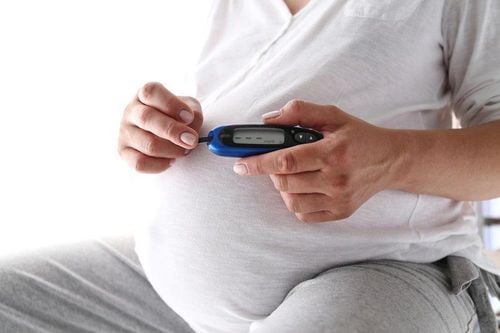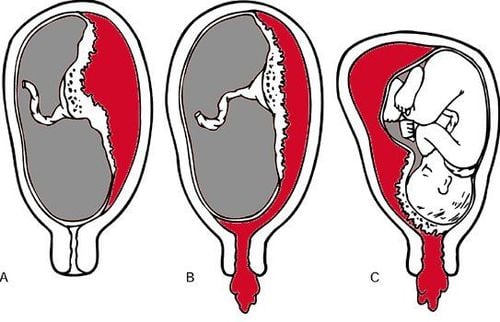This is an automatically translated article.
The article was professionally consulted by Specialist Doctor Obstetrician and Gynecologist - Department of Obstetrics and Gynecology - Vinmec Hai Phong International General Hospital.
Pregnancy is a special process that occurs in a woman's life. During this time, the cardiovascular and nervous systems sometimes fail to adapt to the changes in blood pressure, which leads to dizziness and nausea during pregnancy.
1. Pregnant women are dizzy during pregnancy at what stage?
The phenomenon of dizziness during pregnancy can feel lightheaded and dizzy if you get up too quickly after bending over or after sitting for a long time because the blood in the legs has not been able to move to the heart, causing the blood pressure to drop suddenly, cause dizziness. Usually, pregnant women will experience dizziness during the first 3 months of pregnancy. In some cases, pregnant women may still experience dizziness during the second or third trimester of pregnancy. Because then, the baby starts to grow fast and put pressure on the blood vessels.
Pregnant women will have to experience a lot of morning sickness and nausea in the early stages of pregnancy, these are symptoms that make blood sugar drop and cause loss of appetite thereby making her pregnant feeling dizzy drowsy.
2. What causes dizziness during pregnancy?
The causes of dizziness during pregnancy depend on the stage of pregnancy and can include various changes occurring in the body.
Dizziness during the first 3 months of pregnancy is caused by hormones and other changes in the body that dilate the walls of blood vessels, causing low blood pressure, making pregnant women feel dizzy and lightheaded. In addition, when a pregnant mother's body does not absorb the necessary amount of nutrients through food due to morning sickness, it also makes pregnant women feel tired and dizzy.
Dizziness in the second trimester of pregnancy and dizziness in the last three months of pregnancy because the amount of blood in the body increases by 30% when the fetus develops, causing blood pressure to increase leading to dizziness. In addition, pregnant women experience dizziness. There are also some other reasons as follows:
Pregnant women are dehydrated and anorexia Mother's body temperature is increased Gestational diabetes reduces blood sugar Pre-eclampsia that pregnant women may experience Later in pregnancy Lying on your back in the last months of pregnancy can put too much pressure on the blood vessels that carry blood from the lower body to the heart. This interferes with the optimal circulation in the body causing the heart rate to increase, blood pressure to decrease and thereby causing dizziness. The need for blood in the pregnant mother's body increases, but the amount of hemoglobin responsible for transporting oxygen throughout the body is not enough, causing a feeling of dizziness and fatigue for pregnant women. Going to the sauna will cause blood vessels to dilate, causing low blood pressure, dizziness. Many pregnant women may also feel dizzy when coughing, urinating, or having a bowel movement. These effects can cause pregnant women to have low blood pressure, leading to dizziness during pregnancy.

3. What to do when feeling dizzy during pregnancy?
Some pregnant women may feel dizzy and tired. Others feel nauseous and light-headed or feel a "revolving" type of dizziness. At that time, pregnant women may experience visual changes such as dizziness or collapse, loss of balance.
When experiencing symptoms of dizziness and drowsiness during pregnancy, pregnant women need to do the following:
Ask people around to open doors and windows or go to a well-ventilated place. Sit down slowly to avoid a sudden fall or, if possible, sit with your head about halfway between your knees. Get up slowly, as sudden movements will make dizziness worse. Pregnant women should try to lie on their left side, a small pillow placed under the hips will support this lying position. Doing so improves blood circulation to the brain and makes you feel better. Pregnant women drink a lot of water Snacking and drinking some water or juice will help accumulate a lot of energy. This avoids the risk of dizziness due to low blood sugar Take a cold shower if you feel lightheaded.

4. Measures to help pregnant women prevent dizziness during pregnancy?
Pregnant women can avoid dizziness during pregnancy by:
Avoid standing when getting out of bed or a chair. If lying down, the pregnant mother should get up slowly. After that, you should stand still for a few minutes. Do not stand for too long. If you have to stand in the same place for a long time, you should find a way to move your legs to maintain circulation in your legs. Avoid wearing tight pants but wear loose clothing that will help blood circulate to the lower body better and reduce body temperature Avoid sudden changes in position, especially getting up while sitting or lying down, Because moving suddenly can make you feel dizzy. Pregnant women should drink enough water every day, especially when the weather is hot or when exercising. To avoid hypoglycemia, it is recommended to maintain small, frequent meals throughout the day in addition to 3 main meals. Absolutely do not let your body starve. Do not lie on your back when entering the second trimester of pregnancy Do not bathe with hot water Pregnant women should stay in cool, fresh places to help control their own body temperature Pregnant women do not need to worry too much if you have dizziness due to hunger, heat, sudden changes in position, or seizures. However, frequent or persistent episodes of dizziness should not be ignored. Call your doctor right away if you experience dizziness and any of the following: Blurred vision, Severe headache, palpitations, slurred speech, numbness, vaginal bleeding during pregnancy, chest pain, trouble breathing, Abdominal pain
Dizziness can be normal during pregnancy, but it can also be unusual if the woman has gestational diabetes and is at high risk of preeclampsia. Therefore, during pregnancy, pregnant women should have antenatal check-ups according to the doctor's appointment to detect early signs of abnormalities, thereby taking timely intervention measures.
In order to protect the health of mother and fetus comprehensively, Vinmec provides all-inclusive maternity services (12-27-36 weeks), in which the 12-week maternity package helps monitor the health of mother and baby. early pregnancy, early detection and timely intervention of health problems. In addition to the usual services, the maternity monitoring program from 12 weeks has special services that other maternity packages do not have such as: quantitative angiogenesis factor test for pre-eclampsia, laboratory testing gestational diabetes; Double Test or Triple Test to screen for fetal malformations; ; thyroid screening test; Rubella test; Testing for parasites transmitted from mother to child seriously affects the baby's brain and physical development after birth. After the results of antenatal care and testing are available, doctors will analyze and advise on genetics, nutrition, and a reasonable rest regimen for pregnant women to help mothers and babies have the best health, and develop fetuses. overview.
If you have a need to use maternity services at Vinmec, please register directly at the website to be served.

Please dial HOTLINE for more information or register for an appointment HERE. Download MyVinmec app to make appointments faster and to manage your bookings easily.













